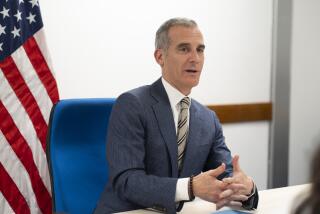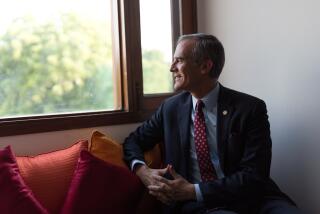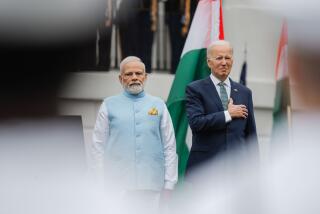International Business : U.S. Delegation Reaps Deals Worth Billions on Mission to India : Trade: Commerce chief Brown leads 26 American CEOs on trip. Agreements range from power plants to jumbo jets.
NEW DELHI — A coal-fired electric plant from a sister company of Southern California Edison. Two Boeing jumbo jets. Cable television to brighten Calcutta nights.
Those were just some of the more than two dozen deals, memoranda of understanding and joint venture plans signed in a visit to India this month by a high-powered American business delegation led by U.S. Commerce Secretary Ronald H. Brown, who pronounced himself “overwhelmed.”
“The extraordinary potential of the Indian market has only started to become apparent, and today’s agreements scratch only the surface,” Brown said during the weeklong trip by his Presidential Business Development Mission to New Delhi, Bangalore and Bombay.
At the U.S. Embassy, staff members are still tallying the dollar implications of the agreements signed last week by the 26 American CEOs who accompanied Brown. The commerce secretary put their value at more than $7 billion, but it will be years in many cases before the fine print is agreed upon and the money spent.
“A lot of the deals are steps forward, granted,” one Delhi-based diplomat said. “But they are big steps forward.”
The lure for American business is the change wrought by the economic reforms launched in 1991 by Prime Minister P.V. Narasimha Rao. India has been classified as one of the 10 major emerging overseas markets by the Clinton Administration.
“No other nation on the face of this Earth offers more potential,” Brown asserted.
But there are numerous areas of disagreement between New Delhi and Washington when it comes to trade laws and practices. In meetings with Indian officials, Brown said, he voiced concern about corruption, high tariffs, red tape, inadequate protection for intellectual property and the government’s monopoly on insurance and other services.
*
Most of the deals had been in the works for months or longer, but Brown’s presence was deemed a good reason to hold signing ceremonies.
The biggest-ticket items concerned the power sector and other areas of India’s aging, inadequate infrastructure, where Brown estimated that Indian investment needs could reach $100 billion by 2000.
In one deal struck by a Southern California firm, Irvine-based Mission Energy Co., and the Tata Group, India’s largest private-sector conglomerate, signed an agreement for a $400-million power project in the eastern state of Bihar.
Tata Iron & Steel is already building the 70-megawatt Jojobera coal-fired electric plant to supply its steel mill and the nearby town of Jamshedpur. The agreement in principle calls for Mission to pay half of Tata’s construction costs on the first unit and take part in boosting the plant’s overall capacity to 300 megawatts, said Mission spokesman James V. Iaco Jr.
“Unit 1 of Jojobera will be the first power station to go into commercial operation since the government of India opened its doors to foreign investment in power-generation facilities,” Mission President and CEO Edward R. Muller predicted.
Mission, a subsidiary of SCEcorp, the parent of Southern California Edison Co., predicted the agreement will create scores of American jobs and a demand for more than $100 million in U.S. goods and services. Commercial documents for the deal are yet to be signed, but they are nearly complete, Iaco said.
Also last week, US West of Englewood, Colo., was given permission to invest $100 million in a breakthrough pilot project to create India’s first non-government-operated telecommunications service. The project, in a fast-growing area of western Tamil Nadu, marks the first entry of private and foreign business into the enormous Indian market for basic phone service.
Tempted by those opportunities, Qualcomm Inc. of San Diego, whose CEO, Irwin Jacobs, was a member of Brown’s delegation, entered into a joint venture with India’s Modi Enterprises to bid on licenses for basic phone service that are up for grabs in other parts of India.
Also in telecommunications, Hughes Aircraft signed a letter of intent with Afro-Asian Satellite Communications for a mobile satellite communications system using two satellites, for a total package valued at $700 million.
That is another California job maker: Hughes builds its satellites in El Segundo.
While Brown and the CEOs were talking up U.S.-India trade, Air India exercised its option to buy two more Boeing 747-400 aircraft, its fifth and sixth. The Indian overseas flag carrier announced it would spend $343.4 million on the 417-seat planes, scheduled to be delivered in 1996.
*
Business sources say Air India is on the verge of choosing between the Boeing 777, the MD-11 and the Airbus 340 to meet its future requirements, and Harry C. Stonecipher, president and CEO of McDonnell Douglas Corp., came with Brown to sing the MD-11’s praises. The MD-11 is built in Long Beach.
In the entertainment field, Denver-based United International Holdings Inc. signed a letter of intent to form a joint venture with RPG Enterprises, one of India’s five largest private companies, to develop a $250-million cable TV network for Calcutta.
Though infamous for squalor and poverty, the vibrant and bustling capital of West Bengal has 1.4 million homes with television sets, the partners estimate. One advantage is that another RPG enterprise, Calcutta Electric Supply Corp., distributes power to the city and already has an extensive network of poles suitable for stringing cable.
To foster even more two-way trade, Brown and Indian Commerce Minister Pranab Mukherjee created the United States-India Commercial Alliance, a government-assisted framework to promote contacts between the countries’ business communities.
*
International Business
* Reprints of Times articles about doing business in foreign countries are available. Call Times on Demand, 808-8463, press *8630 and select Option 1. For articles on Mexico, select Item 2804; for the Philippines, select Item 2805; for Indonesia, select Item 2806; for Hong Kong, select Item 2808. Price is $5.95, plus $1 for delivery. Articles are sent by either fax or mail.
Details on Times electronic services, B4
More to Read
Sign up for Essential California
The most important California stories and recommendations in your inbox every morning.
You may occasionally receive promotional content from the Los Angeles Times.










